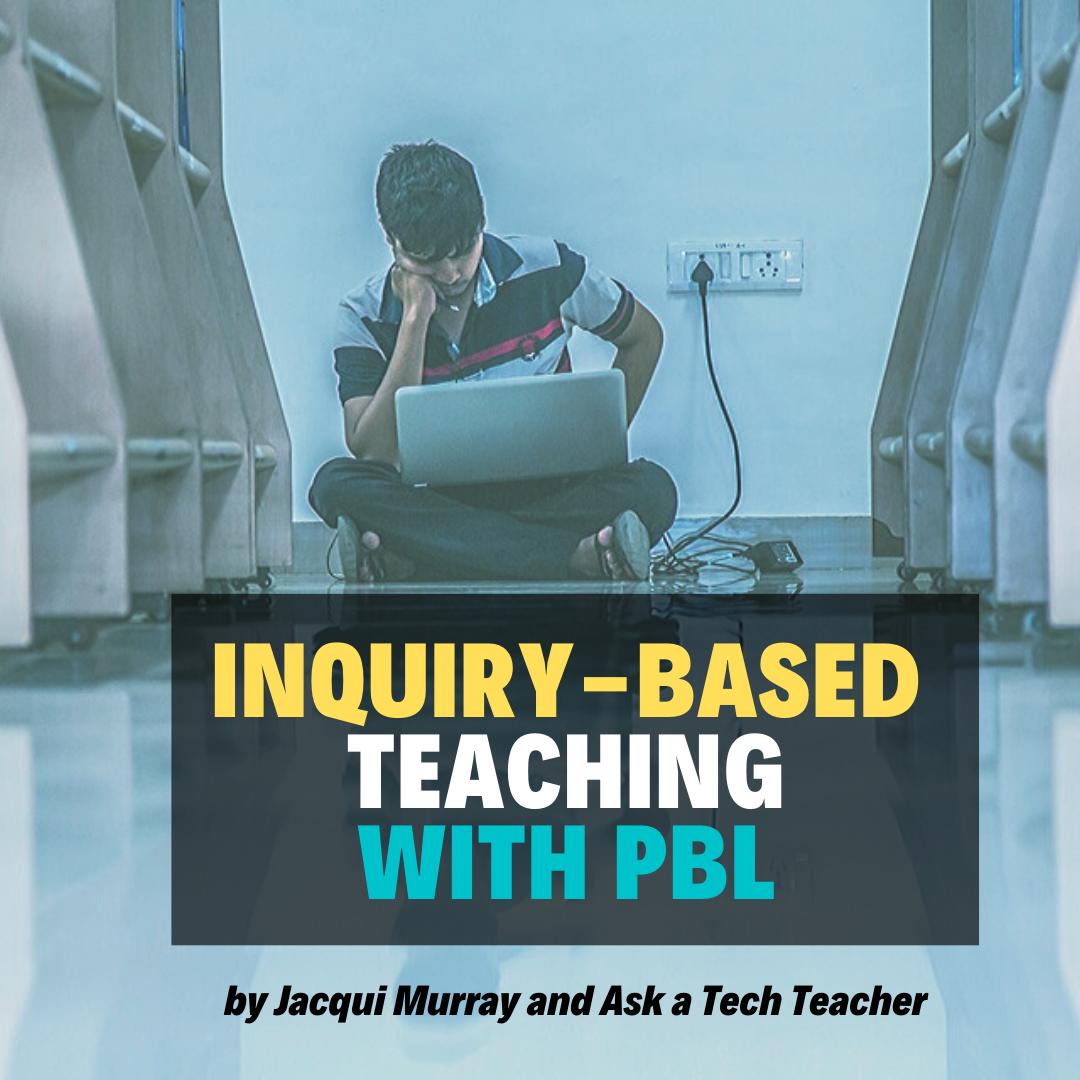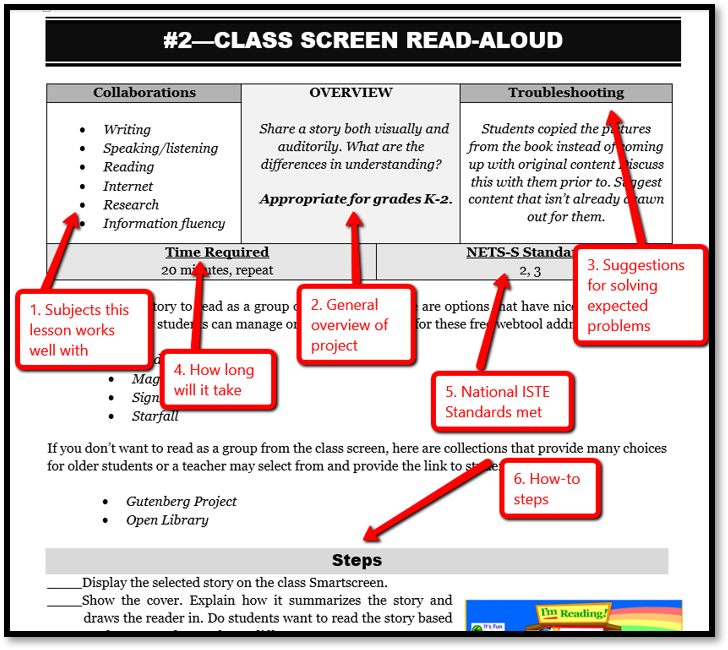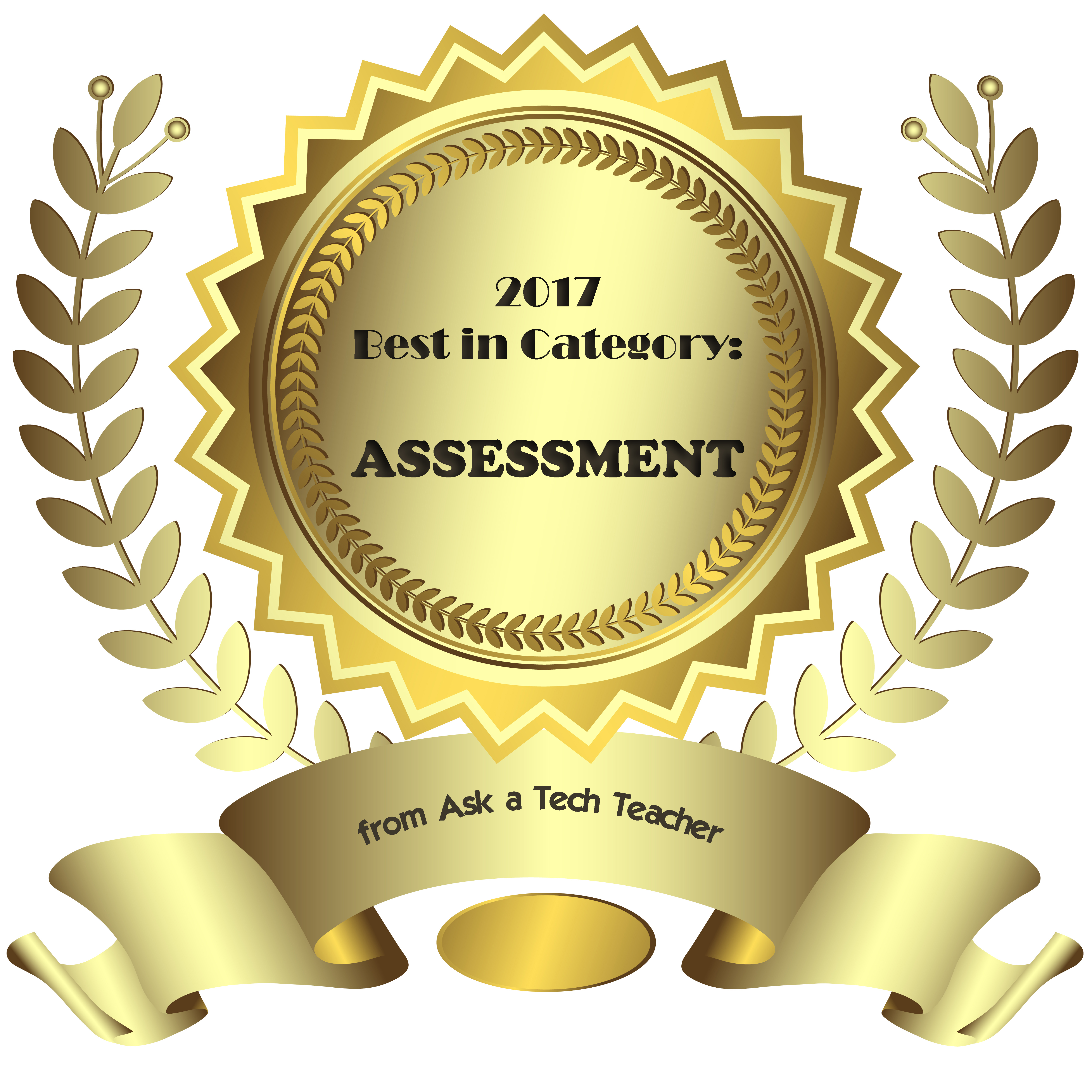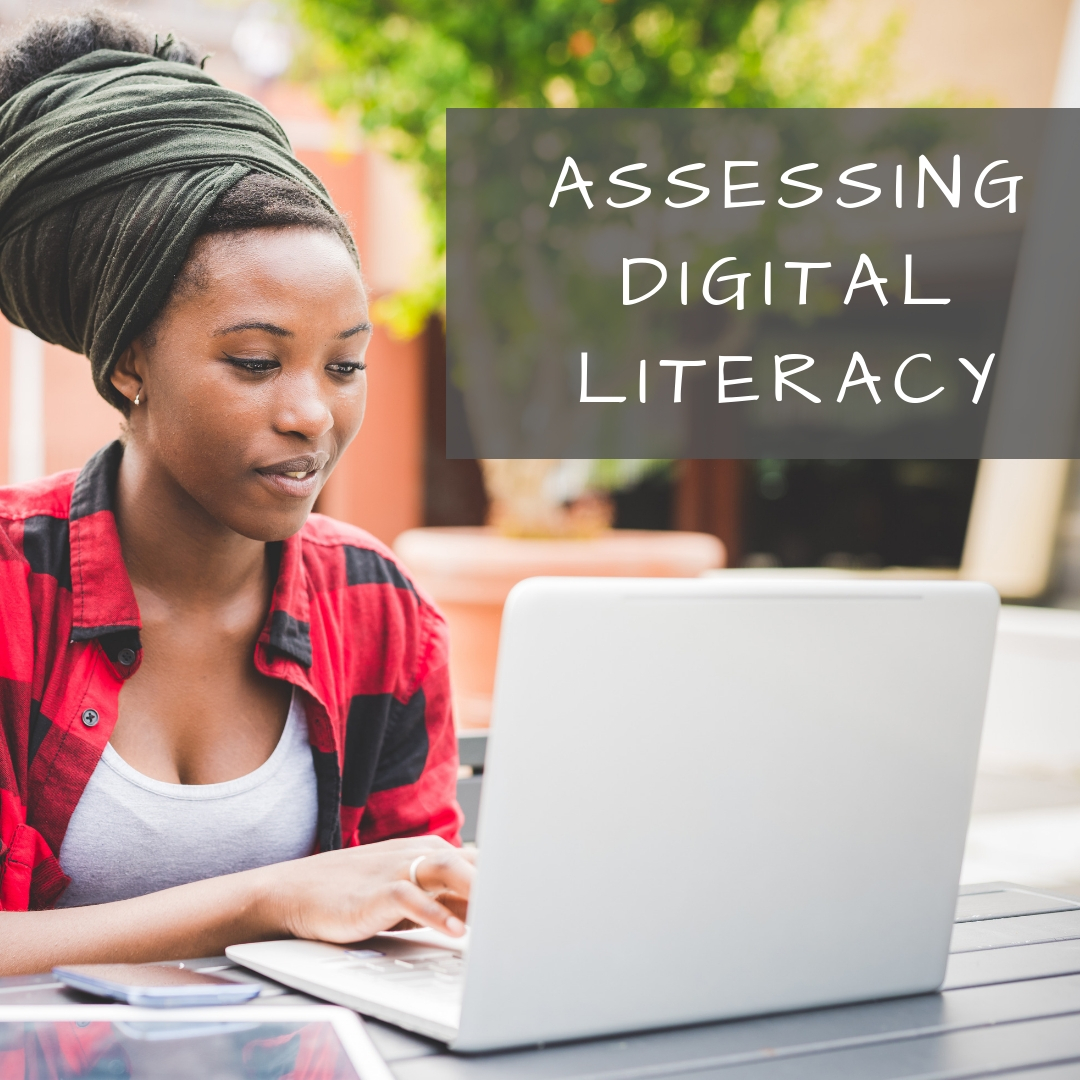Tag: inquiry
14 Tech Assessment Strategies
It used to be simple to post grades. Add up test scores and see what the student earned. Very defensible. Everyone understood. It’s not that way anymore. Here are factors I consider when I’m posting grades for my tech students:
- Does s/he remember skills from prior lessons as they complete current lessons?
- Does s/he show evidence of learning by using tech class knowledge in classroom or home?
- Does s/he participate in class discussions?
- Does s/he complete daily goals (a project, visit a website, watch a tutorial, etc.)?
- Does s/he save to their network folder?
Share this:
11 Ways to Add #Inquiry to Your Class
You became a teacher not to pontificate to trusting minds, but to teach children how to succeed as adults. That idealism infused every class in your credential program and only took a slight bump during your student teacher days. You graduated sure you’d never teach to the test or lecture for 90% of a class.
Then you got a job and reality struck. You had lesson plans to get through, standards to assess, meetings to attend, parents to council, and state-wide tests that students must do well on. A glance in the mirror said you were becoming that teacher you hated in school. You considered leaving the profession. Until a colleague mentioned the inquiry-based classroom, where teaching’s goal was not the solution to a problem but the path followed. It’s what you’d hoped to do long ago when you started–but how do you turn a traditional entrenched classroom into one that’s inquiry-based?
Here are 11 ideas. One or more will resonate with your teaching style:
Share this:
New Book: Inquiry and PBL
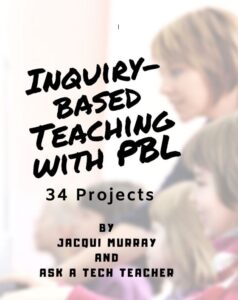 Ask a Tech Teacher has a new book out, Inquiry-based Teaching with PBL: 34 Lesson Plans. Inquiry-based teaching requires a mindset that makes curiosity a cornerstone of learning with lessons that value it. This book includes 34 lesson plans as well as discussion on inquiry-based teaching strategies:
Ask a Tech Teacher has a new book out, Inquiry-based Teaching with PBL: 34 Lesson Plans. Inquiry-based teaching requires a mindset that makes curiosity a cornerstone of learning with lessons that value it. This book includes 34 lesson plans as well as discussion on inquiry-based teaching strategies:
The Inquiry-based Teacher
The Inquiry-based Classroom
The Socratic Method
Project-based Learning (PBL)
Each lesson includes an overview, steps, core collaborations, time required, ISTE standards, troubleshooting, and web-based tools to support learning.
Projects include Talking Pictures, Shape Stroll, Picture the Details, Brainstorming, Life Cycle Reports, Digital Citizenship, Venn Diagrams, Landforms, Cyberbullying, Tessellations, Twitter in Education, and more. Popular webtools used are:
Share this:
How Do You Grade Tech? I Have 14 Ideas
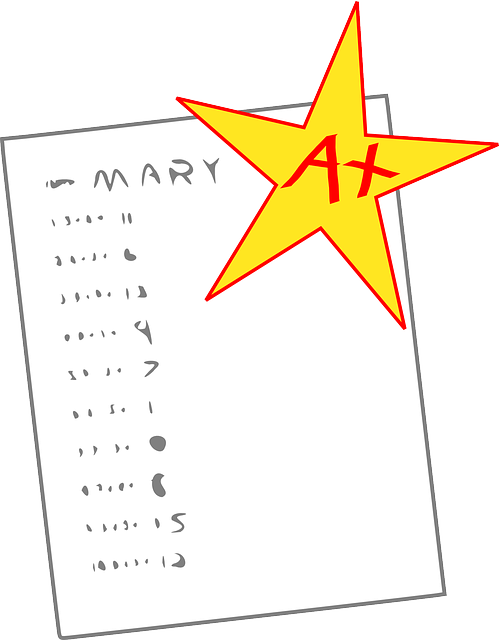 It used to be simple to post grades. Add up test scores and see what the student earned. Very defensible. Everyone understood.
It used to be simple to post grades. Add up test scores and see what the student earned. Very defensible. Everyone understood.
It’s not that way anymore. Now we’re looking for understanding, transfer of knowledge, scaffolding for future learning, habits of mind, depth of knowledge, and a general preparedness for college and/or career. Here are factors I consider when I’m determining grades:
- Does s/he remember skills from prior lessons as they complete current lessons?
- Does s/he show evidence of learning by using tech class knowledge in classroom or home?
- Does s/he participate in class discussions?
- Does s/he complete daily goals (a project, visit a website, watch a tutorial, etc.)?
- Does s/he save to their digital portfolio?
Share this:
How Do You Grade Tech? I Have 14 Ideas
 It used to be simple to post grades. Add up test scores and see what the student earned. Very defensible. Everyone understood.
It used to be simple to post grades. Add up test scores and see what the student earned. Very defensible. Everyone understood.
It’s not that way anymore. Here are the factors I consider when I’m posting grades:
- Does s/he remember skills from prior lessons as they complete current lessons?
- Does s/he show evidence of learning by using tech class knowledge in classroom or home?
- Does s/he participate in class discussions?
- Does s/he complete daily goals (a project, visit a website, watch a tutorial, etc.)?
- Does s/he save to their network folder?
Share this:
Dear Otto: How do I teach Inquiry and Research in Middle School
 Dear Otto is an occasional column where I answer questions I get from readers about teaching tech. If you have a question, please complete the form below and I’ll answer it here. For your privacy, I use only first names.
Dear Otto is an occasional column where I answer questions I get from readers about teaching tech. If you have a question, please complete the form below and I’ll answer it here. For your privacy, I use only first names.
Here’s a great question I got from Ms. F:
Question: I teach 6th, 7th, and 8th grade Instructional Technology. I struggle with the district standard for Inquiry & Research. I can’t seem to find just the right type of assignment/topic because searching this, that, or the other thing is just random, out of context, an exercise in learning key word searching, finding reliable sites,synthesizing info. If I make it too simple they can find all the answers on one site and then just plug in the facts. I had 6th do a What-Happened-In-Your-Birth-Year project where they identified different categories and then searched for an event in that category: Movies (and then find the Oscar winner for that year), Sports, Science, etc. Right now the 7th grade assignment is comparing e-Readers (price, memory, size, features) using a spreadsheet, then drawing conclusions.
Any great ideas that would interest middle school students are welcome!!
THANKS!
Here are some ideas:
Share this:
169 Kindergarten Websites That Tie into Classroom Inquiry
 These are my 120 favorite kindergarten websites. I sprinkle them in throughout the year, adding several each week to the class internet start page, deleting others. I make sure I have 3-4 each week that integrate with classroom inquiry, 3-4 that deal with technology skills and a few that simply excite students about tech.
These are my 120 favorite kindergarten websites. I sprinkle them in throughout the year, adding several each week to the class internet start page, deleting others. I make sure I have 3-4 each week that integrate with classroom inquiry, 3-4 that deal with technology skills and a few that simply excite students about tech.
Here’s the list (check here for updated links):
- Aesop Fables
- Aesop Fables—no ads
- Alphabet Animals
- Alphabet Doors
- Animal Games
- Animal Games II
- Animal Homes II
- Audio stories
- Barnaby and Bellinda Bear
- (more…)
Share this:
11 Ways to Make an Inquiry based Classroom
 You became a teacher not to pontificate to trusting minds, but to teach children how to succeed as adults. That idealism infused every class in your credential program and only took a slight bump during your student teacher days. That educator, you figured, was a dinosaur. You’d never teach to the test or lecture for forty minutes of a forty-five minute class.
You became a teacher not to pontificate to trusting minds, but to teach children how to succeed as adults. That idealism infused every class in your credential program and only took a slight bump during your student teacher days. That educator, you figured, was a dinosaur. You’d never teach to the test or lecture for forty minutes of a forty-five minute class.
Then you got a job and reality struck. You had lesson plans to get through, standards to assess, and state-wide tests that students must do well on or you’d get the blame. A glance in the mirror said you were becoming that teacher you hated in school. You considered leaving the profession.
Until the inquiry-based classroom arrived where teaching’s goal was not the solution to a problem, but the path followed. It’s what you’d hoped to do long ago when you started–but how do you turn a traditional entrenched classroom into one that’s inquiry-based?
Share this:
11 Ways to be an Inquiry-based Teacher
 It’s hard to run an inquiry-based classroom. Don’t go into this teaching style thinking all you do is ask questions and observe answers. You have to listen with all of your senses, pause and respond to what you heard (not what you wanted to hear), keep your eye on the Big Ideas as you facilitate learning, value everyone’s contribution, be aware of the energy of the class and step in when needed, step aside when required. You aren’t a Teacher, rather a guide. You and the class find your way from question to knowledge together.
It’s hard to run an inquiry-based classroom. Don’t go into this teaching style thinking all you do is ask questions and observe answers. You have to listen with all of your senses, pause and respond to what you heard (not what you wanted to hear), keep your eye on the Big Ideas as you facilitate learning, value everyone’s contribution, be aware of the energy of the class and step in when needed, step aside when required. You aren’t a Teacher, rather a guide. You and the class find your way from question to knowledge together.
Because everyone learns differently.
You don’t use a textbook. Sure, it’s a map, showing you how to get from here to there, but that’s the problem. It dictates how to get ‘there’. For an inquiry-based classroom, you may know where you’re going, but not quite how you’ll get there and that’s a good thing. You are no longer your mother’s teacher who stood in front of rows of students and pointed to the blackboard. You operate well outside your teaching comfort zone as you try out the flipped classroom and the gamification of education and are thrilled with the results.
And then there’s the issue of assessment. What your students have accomplished can’t neatly be summed up by a multiple choice test. When you review what you thought would assess learning (back when you designed the unit), none measure the organic conversations the class had about deep subjects, the risk-taking they engaged in to arrive at answers, the authentic knowledge transfer that popped up independently of your class time. You realize you must open your mind to learning that occurred that you never taught–never saw coming in the weeks you stood amongst your students guiding their education.
Let me digress. I visited the Soviet Union (back when it was one nation) and dropped in on a classroom where students were inculcated with how things must be done. It was a polite, respectful, ordered experience, but without cerebral energy, replete of enthusiasm for the joy of learning, and lacking the wow factor of students independently figuring out how to do something. Seeing the end of that powerful nation, I arrived at different conclusions than the politicians and the economists. I saw a nation starved to death for creativity. Without that ethereal trait, learning didn’t transfer. Without transfer, life required increasingly more scaffolding and prompting until it collapsed in on itself like a hollowed out orange.
Share this:
14 Factors to Consider for Tech Report Cards
 It used to be simple to post grades. Add up test scores and see what the student earned. Very defensible. Everyone understood.
It used to be simple to post grades. Add up test scores and see what the student earned. Very defensible. Everyone understood.
It’s not that way anymore. Here are the factors I consider when I’m posting grades:
- Does s/he remember skills from prior lessons as they complete current lessons?
- Does s/he show evidence of learning by using tech class knowledge in classroom or home?
- Does s/he participate in class discussions?
- Does s/he complete daily goals (a project, visit a website, watch a tutorial, etc.)?
- Does s/he save to their network folder?





